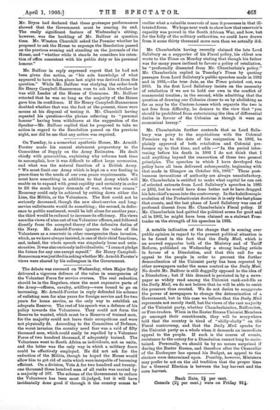On Tuesday, in a somewhat apathetic House, Mr. Arnold. Forster
made his annual statement preparatory to the Committee of Supply on the Army Estimates. He dealt chiefly with generalities, explaining why reforms took time to accomplish, how it was difficult to effect large economies, and what was the natural function of a British Army. "We must limit our Army which is kept on a war footing in peace-time to the needs of our own peace requirements. We must have something in addition to that Army which will enable us to expand with great rapidity and certainty in order to fill the much larger demands of war, when war comes." Economy could only be achieved by cutting down either the Line, the Militia, or the Volunteers. The first could not be seriously decreased, though the new short-service and long- service enlistments would do something ; the second, in defer- ence to public sentiment, would be left alone for another year; the third would be reduced to increase its efficiency. His views were the views of nine out of ten Volunteerofficers, and followed directly from the accepted theory of the defensiVe duties of the Navy. Mr. Arnold-Forster ignores the value of the Volunteers as a reservoir in other emergencies than invasion, which, as we have always insisted, is one of their chief functions, and, indeed, the whole speech was singularly loose and unin- structive. It was also curiously individualistic. "I cannot pledge the future for any one except myself." Sir Henry Campbell- Bannerman was j u stifled in asking whether Mr. Arnold-Forster's views were shared by his colleagues in the Government.






































 Previous page
Previous page